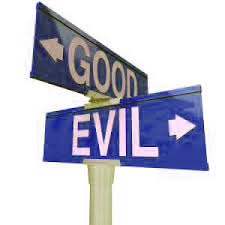 Most of what I say in this entry is not original, except that, here, I say it for myself. It's remotely possible that some of my conclusions may be novel, though that hardly seems likely. Still, it's satisfying to say it.
Most of what I say in this entry is not original, except that, here, I say it for myself. It's remotely possible that some of my conclusions may be novel, though that hardly seems likely. Still, it's satisfying to say it.
Notions of GOOD and EVIL are purely subjective determinations. In other words, outside of the way most human beings think about things,
good and
evil do not exist in
any form.

Most of us interpret the things we want to happen as
good, and the things we don't want to happen as
bad. If there is some association we can manufacture between those
bad things and some person, group or cause, then the
bad things tend to be described as
evil. In extreme cases, evil may be personified in a Christian mythological character called Satan.
In point of fact, however, the very same circumstances can be interpreted as either good or bad by different people. For instance, if two people are vying for the same job, only one of them will get that job. The person hired will see it as good, the person not hired will see it as bad. If the one not hired thinks that the other was less worthy and undeserving, then the circumstances begin to smack of evil. If the unsuccessful applicant complains about the unworthiness of the other, and that other hears about it, he or she may begin to think the unsuccessful candidate is evil. Good and evil, like beauty, are in the eye of the beholder.


I'm sure most of us would be able to point to certain people or particular
situations and feel confident in labelling them as good or evil. Well, let's get down to brass tacks:
Abraham Lincoln vs. Adolf Hitler.
While the majority of Americans view Lincoln as one of our greatest presidents, it's not a universally held value even today. What's more, about 155 years ago, a goodly portion of our citizenry considered Lincoln the personification of corporate greed, political oppression, militant violence and government-sanctioned terrorism—what most of us would consider
evil.
Conversely, around 75 years ago, a large portion of the citizens of Germany (Deutschland) considered Adolf Hitler the heroic leader who would bring them out of the social and economic woes imposed on them by the unjust and repressive Treaty of Versailles and the avaricious influence of a particular ethnic group. For that matter, many American citizens—and not all of them Germans—admired Hitler and what he stood for. Some still do today.
I don't intend to defend or criticise those opinions or the actions of the leaders in question. I only intend to point out that many people can hold opposing views of what is good or evil and hold those differing views in all honesty and sincerity.

Even your run-of-the-mill "bad guy" probably doesn't get up in the morning, rub his hands together and say to himself, "Now, what bad things can I do today?" Much more likely he simply sees circumstances he wants to alter: he wants money, you have money. He may know it's against the law to take it from you, but that's not really his concern. For him, if he has your money it will be a
good thing.
In our time, terrorism is often defined as evil. But, as has been pointed out, one man's terrorist is another man's freedom fighter. It would be difficult to find a large religious group whose members, even if a minority, have not perpetrated violence upon so-called non-believers; nor is there any race or ethnic group which has not visited violence on others simply for not being like them. The popular conceit from the view of the perpetrators, however, is that the violence is a
good thing. The victim groups have quite the opposite view and tend to think of those same perpetrators as
evil.
In a different characterization, people often describe natural events and circumstances as evil. Disease, tsunamis, accidental injuries, famine and various other calamities, cataclysms and catastrophes have been laid on the doorstep of evil. Yet all of these are commonly occurring, natural events that have clearly definable causes. People simply tend to
see them as bad; this is not to suggest they are not devastating to those afflicted. Nonetheless, it's still a matter of perspective. If a tsunami floods an uninhabited shore, it's simply a natural phenomenon. If it washes away a town full of people, it's seen as a terrible disaster. In either case, the tsunami simply is a natural event; it's our subjective experience that imposes a value, not the thing itself.
As to people, they might be stupid, greedy, crazy, misguided or sociopathic, but those, too, are naturally occurring phenomena. To attribute any behavior to evil shows a profound misunderstanding of the human psyche.

To sum up, good and evil only exist as subjective value definitions by human beings; moreover, those definitions are frequently in opposition for the same person, event or circumstances. In our objective reality, good and evil do not exist.
Get over it.
!






